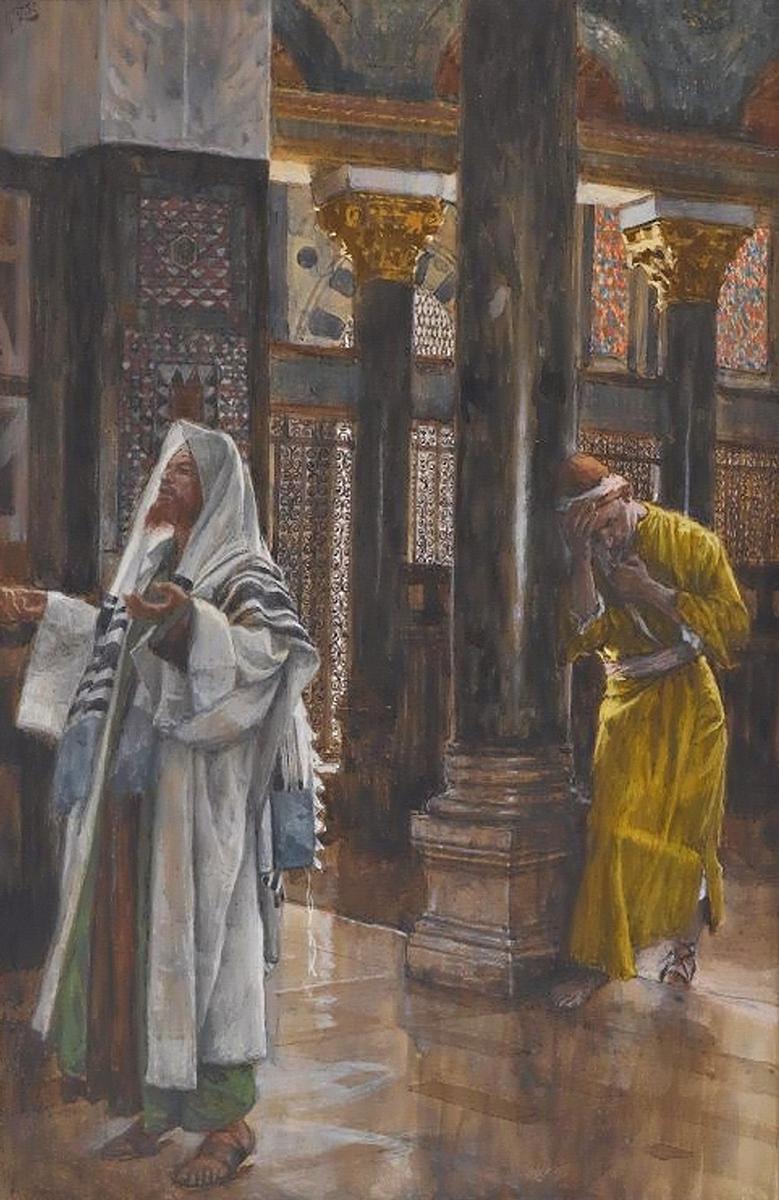March 7: The Publican and the Pharisee — A Prayer
♫ Music:
Friday, March 7—Day 3
And He also told this parable to some people who trusted in themselves that they were righteous, and viewed others with contempt: “Two men went up into the temple to pray, one a Pharisee and the other a tax collector. The Pharisee stood and was praying this to himself: ‘God, I thank You that I am not like other people: swindlers, unjust, adulterers, or even like this tax collector. I fast twice a week; I pay tithes of all that I get.’ But the tax collector, standing some distance away, was even unwilling to lift up his eyes to heaven, but was beating his breast, saying, ‘God, be merciful to me, the sinner!’ I tell you, this man went to his house justified rather than the other; for everyone who exalts himself will be humbled, but he who humbles himself will be exalted.”
Luke 18:9-14
The Publican and the Pharisee — A Prayer
A Pharisee, overcome with vanity, boasted and was deprived of blessings, while a Publican bowed down in repentance, kept silent and was counted worthy.
Christ raises up the Publican from his abasement and humbles the Pharisee in his pride; let me then emulate the good actions of the Publican and hate the evil sin of the Pharisee. In faith let me embrace humility and utterly abhor the ways of pride. I groan as the Publican, and with lamentations that are never silent I draw near to Your compassion. Be merciful to me, for I long to live out my days in humility.
Let me not pray as the Pharisee: for he who exalts himself will be humbled. Let me humble myself before God, and with fasting cry aloud as the Publican: Lord be merciful to me a sinner.
Almighty Lord, I know the great power of tears. Tears led Hezekiah up from the gates of death; tears delivered the sinful woman from the transgressions of many years; tears justified the Publican above the Pharisee. And with tears I also pray: Lord have mercy on me a sinner.
As I ponder my wretchedness and the many evil things that I have done, I tremble for the fearful day of judgment. But trusting in Your merciful compassion, like David I cry aloud to You: Have mercy on me, O God, in Your great mercy.
O Lord my God, there is none holy as You. From the dung-hill of passions the humble is lifted up on high, while the proud-hearted suffers a grievous fall from the height of the virtues: let me flee from my evil ways. Grant me to seek humility, O Savior, and bestow upon me the portion of the Publican. Let me cast away the swollen boasting and evil folly of the Pharisee, his loathsome pride and wicked cruelty, hateful to God.
As the Publican, let me beat my breast and cry out, “God be merciful to me a sinner,” that, like him, I may receive forgiveness.
The Publican and the Pharisee ran the race of life together, but the one was overcome by foolish pride and brought to shameful shipwreck, while the other was saved by humility. Let me emulate the wisdom of the Publican and flee from the hateful conceit of the Pharisee; and so let me attain life everlasting. Let me eagerly follow the ways of Jesus my Savior and His great humility. Lord be merciful to me, for You alone forgive!
Adapted from The Lenten Triodion: The Sunday of the Publican and the Pharisee (South Canaan, PA: St Tikhon’s Seminary Press, 2002), 99-111
Day 3—Friday, March 7
The Pharisee and the Publican
James Tissot
Brooklyn Museum of Art
Opaque watercolor over graphite on gray woven paper
About the Artist and Art
James Tissot (1836-1902) was a French Impressionist painter and illustrator who was friends with fellow artists Edgar Degas, Édouard Manet and the American painter, James McNeil Whistler. Known for his bourgeois lifestyle, in 1888 he underwent a religious conversion when he entered a church to “catch the atmosphere for a picture,” and thereafter devoted himself to religious subjects. He visited the Holy Land in 1886-87 and again in 1889. His many biblical works were enormously popular, both in book form and when the original drawings and paintings were exhibited.
The Pharisee and the Publican, part of Tissot’s impressive series “The Life of Our Lord Jesus Christ,” depicts the drastically different attitudes of the two men as they approach God in prayer.
About the Music
Lord Have Mercy lyrics:
Gospodi pomilui (Russian)
Lord Have Mercy (English)
About the Performers
The Moscow Cathedral Choir was originally founded in 1721 as part of The Moscow Synodal School. After a temporary disbandment in 1919 the choir was later revived in 1999, and continues to perform and record sacred music until this day.
“Lord Have Mercy” is a traditional Russian Orthodox chant, with this version sung in both Russian and English.
